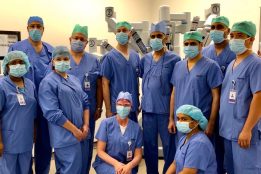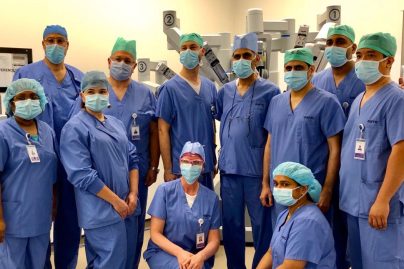Experts say parents can play a vital role in intervention for children with Autism
Sat 02 Apr 2022
Parents can play a significant role in improving the outcomes of a child with autism spectrum disorder (ASD) by ensuring early detection and intervention, and by their central involvement in the child’s overall treatment program, says an expert from the Cleveland Clinic global health system marking World Autism Awareness Day today.
Cynthia Johnson, PhD, Director of Cleveland Clinic Children’s Center for Autism in Cleveland and Professor of Pediatrics, says: “It is important for all parents to be aware of the signs to look for because early ASD diagnosis and interventions will maximize optimal outcomes. Parents can also play a direct role in these interventions. There are parent education programs that offer information and support, as well as parent training programs that teach specific strategies to help address the core features of social and communication weaknesses and improve interfering behavior such as severe tantrums, sleep disturbances and feeding problems.
Dr. Johnson says that there are two key components to ASD, with diagnosis possible as early as in the first year of life. First, there is a deficit in communication and/or a deficit in using communication socially, for example, not making conventional eye contact and not using non-verbal cues such as pointing and waving. Second, restrictive or repetitive behaviors are present. Diagnosis comes after interviews with parents and teachers, along with specialized autism-specific tests.
According to the World Health Organization, globally, around 1 in 160 children has ASD.
“Parents with toddlers and preschool-aged children should be on the lookout for delayed speech and unusual communication development. Possible symptoms can include lack of use of gestures, repetitive speech or phrases; limited imitation of other people’s actions and emotions; atypical, repetitive and restricted play; engaging in repetitive motor movement such as hand flapping or finger flicking; or oversensitivity to sound,” says Dr. Johnson. “The earlier that we can identify ASD, the faster we can address these patients’ differences and help to avoid a cascade of disruptions in early development.”
Treatment programs are individualized and start with applied behavior analysis (ABA) therapies often referred to as early intensive behavior intervention (EIBI), says Dr. Johnson. “These therapies focus on the core features of ASD, such as social difficulties and communication, and also address repetitive behaviors and other behaviors that interfere with a child’s functioning. Supplementary therapies such as occupational or speech therapy might also be appropriate, while medication is often used to treat disruptive behaviors as well as attention weakness and hyperactivity,” she adds.
Dr. Johnson says that patients with ASD are more likely to have seizures, epilepsy, gastrointestinal and nutritional issues, sleep disturbances, depression and anxiety, so a holistic program will address these issues alongside the core ASD characteristics.
Another important consideration is to incorporate parent education and training into the treatment program, says Dr. Johnson. “Over the years we have seen how effective it can be for parents to intervene with their children to improve their developmental skills and overall functioning. Parent training programs instruct parents in applied behavior analysis principles and provide targeted strategies for – among others – behavioral, feeding and sleep problems, which can significantly improve parental stress and overall family functioning.”
Dr. Johnson adds, “Through a combination of didactic sessions, parent-child coaching and parenting groups, we can help improve the interactions between the parents and the child, and help parents devise strategies for how to help the child socially and how to approach challenges that arise, for example, during family outings.”
Although the COVID-19-related restrictions were extraordinarily challenging for families who have a child with ASD, Dr. Johnson points out that the pandemic also created opportunities for parents to be more involved in interventions and see the results firsthand. “Parents saw how effective their involvement could be in helping children successfully master new skills, and set them up for success. Families can be a really powerful resource to help children learn developmentally appropriate skills, enhance their independence, and harness their unique abilities,” Dr. Johnson concludes.
Source: Cleveland Clinic
Disclaimer: All views and opinions expressed in TheBrew Opinion – our opinion section – are those of the authors and do not necessarily reflect the official policy or position of TheBrew.ae, the company, or any of its members.

 Apr 27 2024
Apr 27 2024













